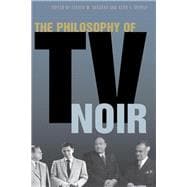
What is included with this book?
| Preface and Acknowledgments | p. vii |
| An Introduction to the Philosophy of TV Noir | p. 1 |
| Realism, Relativism, and Moral Ambiguity | |
| Dragnet, Film Noir, and Postwar Realism | p. 33 |
| Naked City: The Relativist Turn in TV Noir | p. 49 |
| John Drake in Greeneland: Noir Themes in Secret Agent | p. 69 |
| Action and Integrity in The Fugitive | p. 83 |
| Existentialism, Nihilism, and the Meaning of Life | |
| Noir et Blanc in Color: Existentialism and Miami Vice | p. 95 |
| 24 and the Existential Man of Revolt | p. 115 |
| Carnivale Knowledge: Give Me That Old-time Noir Religion | p. 131 |
| The Sopranos, Film Noir, and Nihilism | p. 143 |
| Crime Scene Investigation and the Logic of Detection | |
| CSI and the Art of Forensic Detection | p. 161 |
| Detection and the Logic of Abduction in The X-Files | p. 179 |
| Autonomy, Selfhood, and Interpretation | |
| Kingdom of Darkness: Autonomy and Conspiracy in The X-Files and Millennium | p. 203 |
| The Prisoner and Self-Imprisonment | p. 229 |
| Twin Peaks, Noir, and Open Interpretation | p. 247 |
| List of Contributors | p. 261 |
| Index | p. 265 |
| Table of Contents provided by Ingram. All Rights Reserved. |
The New copy of this book will include any supplemental materials advertised. Please check the title of the book to determine if it should include any access cards, study guides, lab manuals, CDs, etc.
The Used, Rental and eBook copies of this book are not guaranteed to include any supplemental materials. Typically, only the book itself is included. This is true even if the title states it includes any access cards, study guides, lab manuals, CDs, etc.